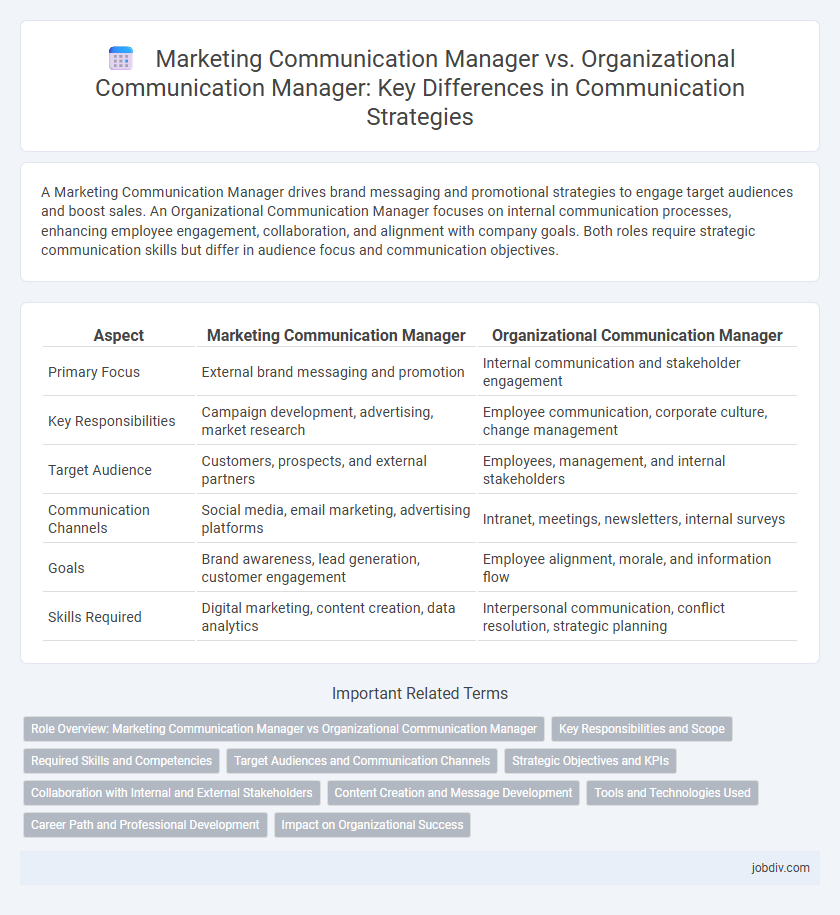A Marketing Communication Manager drives brand messaging and promotional strategies to engage target audiences and boost sales. An Organizational Communication Manager focuses on internal communication processes, enhancing employee engagement, collaboration, and alignment with company goals. Both roles require strategic communication skills but differ in audience focus and communication objectives.
Table of Comparison
| Aspect | Marketing Communication Manager | Organizational Communication Manager |
|---|---|---|
| Primary Focus | External brand messaging and promotion | Internal communication and stakeholder engagement |
| Key Responsibilities | Campaign development, advertising, market research | Employee communication, corporate culture, change management |
| Target Audience | Customers, prospects, and external partners | Employees, management, and internal stakeholders |
| Communication Channels | Social media, email marketing, advertising platforms | Intranet, meetings, newsletters, internal surveys |
| Goals | Brand awareness, lead generation, customer engagement | Employee alignment, morale, and information flow |
| Skills Required | Digital marketing, content creation, data analytics | Interpersonal communication, conflict resolution, strategic planning |
Role Overview: Marketing Communication Manager vs Organizational Communication Manager
Marketing Communication Managers design and implement strategies to promote products or services, focusing on brand positioning, advertising campaigns, and market research to drive customer engagement and sales growth. Organizational Communication Managers oversee internal communication channels, ensuring effective information flow between leadership and employees to enhance workplace culture, employee engagement, and change management. Both roles require strong communication skills, but Marketing Communication Managers prioritize external audience targeting, whereas Organizational Communication Managers focus on internal stakeholder alignment.
Key Responsibilities and Scope
A Marketing Communication Manager primarily develops and executes promotional strategies to enhance brand awareness, drive customer engagement, and support sales objectives through advertising, public relations, and digital campaigns. In contrast, an Organizational Communication Manager focuses on internal communications, employee engagement, and corporate messaging to align workforce culture and facilitate effective information flow within the company. Both roles require strategic communication skills, but the Marketing Communication Manager targets external audiences, while the Organizational Communication Manager manages internal stakeholder relations.
Required Skills and Competencies
Marketing Communication Managers excel in brand strategy, digital marketing, and audience engagement, requiring strong skills in content creation, SEO, and analytics to drive campaigns and measure performance. Organizational Communication Managers specialize in internal communication, change management, and employee engagement, demanding competencies in interpersonal communication, conflict resolution, and organizational development. Both roles necessitate proficiency in communication technologies and strategic thinking but diverge in focus--external market impact versus fostering internal alignment and culture.
Target Audiences and Communication Channels
Marketing Communication Managers primarily target external audiences such as customers, prospects, and partners, utilizing channels like social media, advertising platforms, email campaigns, and public relations to drive brand awareness and sales. Organizational Communication Managers focus on internal audiences, including employees, management, and stakeholders, leveraging intranets, internal newsletters, meetings, and collaboration tools to enhance corporate culture and information flow. Both roles require strategic channel selection to effectively engage their distinct target groups and align messaging with organizational goals.
Strategic Objectives and KPIs
Marketing Communication Managers focus on brand awareness, customer engagement, and lead generation, targeting KPIs such as conversion rates, social media reach, and campaign ROI to drive business growth. Organizational Communication Managers prioritize internal alignment and culture enhancement, measuring success through employee engagement scores, communication effectiveness surveys, and retention rates. Both roles align with strategic objectives but differ in audience focus--external customers versus internal stakeholders--impacting their specific communication metrics.
Collaboration with Internal and External Stakeholders
Marketing Communication Managers collaborate closely with external stakeholders such as advertising agencies, media partners, and customers to craft targeted campaigns that drive brand awareness and sales. Organizational Communication Managers emphasize internal collaboration, working with HR, leadership, and employees to ensure consistent messaging and foster a cohesive corporate culture. Both roles are pivotal in aligning communication strategies but differ in stakeholder focus and objectives.
Content Creation and Message Development
Marketing Communication Managers specialize in crafting persuasive content tailored to target audiences, focusing on brand promotion and customer engagement through strategic message development. Organizational Communication Managers prioritize internal messaging, fostering clear and consistent communication that supports company culture and employee alignment. Both roles demand expertise in content creation, but their objectives diverge between external market influence and internal organizational cohesion.
Tools and Technologies Used
Marketing Communication Managers primarily utilize tools like Adobe Creative Suite, HubSpot, and Google Analytics to develop, execute, and measure integrated marketing campaigns across digital and traditional channels. Organizational Communication Managers rely on platforms such as Microsoft Teams, Slack, and internal intranet systems to facilitate transparent and efficient communication within the organization. Both roles leverage data analytics software, but the Marketing Communication Manager emphasizes customer engagement metrics, while the Organizational Communication Manager focuses on employee communication effectiveness and collaboration tools.
Career Path and Professional Development
Marketing Communication Managers typically advance by specializing in brand strategy, digital marketing, and customer engagement, often moving toward roles like Chief Marketing Officer or Brand Director. Organizational Communication Managers focus on internal communications, change management, and employee engagement, with career trajectories leading to Corporate Communication Director or Chief Communications Officer. Both roles require continuous skill development in strategic messaging, cross-functional collaboration, and data analytics for measuring communication effectiveness.
Impact on Organizational Success
Marketing Communication Managers drive brand awareness and customer engagement by crafting strategic campaigns that align with market trends and consumer behavior, directly boosting sales and revenue growth. Organizational Communication Managers enhance internal communication flow, employee alignment, and corporate culture, leading to increased productivity, reduced turnover, and stronger stakeholder relationships. Both roles are critical for organizational success, with Marketing Communication Managers focusing on external positioning and Organizational Communication Managers ensuring cohesive internal messaging.
Marketing Communication Manager vs Organizational Communication Manager Infographic

 jobdiv.com
jobdiv.com